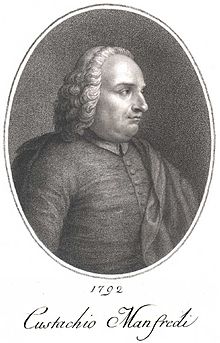Eustachio Manfredi
| Eustachio Manfredi | |
|---|---|

Eustachio Manfredi engraving dated 1792 by Francesco Rosaspina
|
|
| Born |
20 September 1674 Bologna, Papal States |
| Died | 15 February 1739 (aged 64) Bologna, Papal States |
| Nationality | Bolognese |
| Occupation | Mathematician , astronomer and poet |
Eustachio Manfredi (20 September 1674 – 15 February 1739) was an Italian mathematician, astronomer and poet.
Eustachio Manfredi was born in Bologna on 20 September 1674. He attended Jesuit school, then studied at the University of Bologna, graduating with a degree in law in 1691. At the same time he devoted himself to scientific studies in mathematics and astronomy, and to literature.
Manfredi founded the Academy degli Inquieti in Bologna around 1690 as a place where scientific topics could be discussed. At first, the Academy held its meetings in Manfredi's house. After four years it moved to Jacopo Sandri's house, which had more space, and in 1705 moved again to the palazzo of Conte Luigi Ferdinando Marsigli. The Accademia delle Scienze dell'Istituto di Bologna was formally inaugurated in 1714, and the Accademia degli Inquieti merged into it.
In 1698 Manfredi obtained the chair of mathematics at the University of Bologna. In 1704 he was named "Superintendent of the waters of Bologna", and was also made head of the college of Montalto, which educated young men destined for a clerical career. In 1711 he became director of the Astronomical Observatory of Bologna, a position he held until his death. He was a member of the French Academy of Sciences in Paris from 1726 and of the Royal Society of London from 1729. He died in Bologna on 15 February 1739.
Manfredi's scientific work was impressive. On 29 November 1707 Manfredi and Vittorio Francesco Stancari discovered the comet C/1707 W1. Among his scientific works are Ephemerides motuum coelestium (1715–1725), De transitu Mercurii per solem anno 1723 (1724), De gnomone meridiano bononiensi (1736) and Instituzioni astronomiche] (1749), a posthumous work.
The asteroid 13225 Manfredi was named in honor of Eustachio Manfredi and his two brothers Gabriele Manfredi and Eraclito Manfredi. Eustachio Manfredi provided "the first demonstration, though unsought, of the revolution of the Earth around the Sun, and thus the reality of a heliocentric system". As a result of this discovery, the Church admitted the scientific natures of Galilean system and removed from the index many works of Galileo Galilei.
...
Wikipedia
